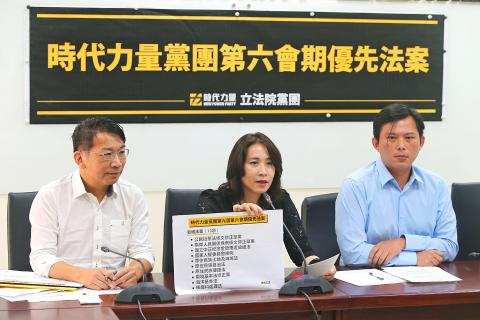The New Power Party (NPP) caucus yesterday said it would propose legal amendments to counter China’s new residency cards for Taiwanese and would draft a bill to ease restrictions on holding a national referendum.
The party would push for the passage of 40 bills and amendments in the coming legislative session, NPP Executive Chairman Huang Kuo-chang (黃國昌) told a news conference, adding that 10 of the bills would be new proposals.
The party would propose amendments to the Act Governing Relations Between the People of the Taiwan Area and the Mainland Area (台灣地區與大陸地區人民關係條例), as Beijing’s new residency cards for residents of Taiwan, Hong Kong and Macau have severe repercussions for Taiwan’s national sovereignty and the rights of Taiwanese, NPP Legislator Hsu Yung-ming (徐永明) said.

Photo: CNA
“The unilateral move by Beijing forces Taiwanese to apply with Chinese authorities for household registration to receive the residency card,” he said. “It is a ‘united front’ ploy by Beijing to undermine Taiwan’s national sovereignty and to deceive the world that Taiwan is under Chinese administration.”
“The government needs to fight this with countermeasures. The NPP will seek to amend the act to require Taiwanese who have applied for the Chinese residency card to report their conduct and to suspend or cancel their household registration” in Taiwan, Hsu added.
Beijing’s move seeks to circumvent Article 9-1 of the act, which stipulates that “the people of Taiwan Area may not have household registration in the Mainland Area or hold passports issued by the Mainland Area.”
“The amendment is a priority for the upcoming legislative session, because the Mainland Affairs Council has reacted to [China’s move] feebly. The government needs to react more strongly,” Hsu said.
Other proposals on the party’s agenda include amendments to the Referendum Act (公民投票法), the National Security Act (國家安全法), the Classified National Security Information Protection Act (國家機密保護法) and the Judges Act (法官法), which would seek to remove unsuitable judges and prosecutors who have broken the law, Huang said.
The party is also to propose a bill to institute a jury system for criminal prosecution.
NPP Legislator Kawlo Iyun Pacidal said she would lead the drive for legal amendments to protect the rights of the nation’s Aborigines, such as by changing the Mining Act (礦業法) to require mining companies to obtain the consent of communities near mining areas and to conduct an environmental impact assessment before starting operations.
She said she would also push for the passage of a proposed indigenous autonomy act; an indigenous traditional land and marine territory act; an indigenous traditional knowledge and biodiversity protection act; and an indigenous health act.
NPP Legislator Freddy Lim (林昶佐) said he would press for the passage of a proposed national languages development act, “so that people can speak their mother tongues and promote the nation’s major languages without discrimination, whether they be Mandarin, Hoklo [commonly known as Taiwanese], Hakka or Aboriginal languages.”

‘DENIAL DEFENSE’: The US would increase its military presence with uncrewed ships, and submarines, while boosting defense in the Indo-Pacific, a Pete Hegseth memo said The US is reorienting its military strategy to focus primarily on deterring a potential Chinese invasion of Taiwan, a memo signed by US Secretary of Defense Pete Hegseth showed. The memo also called on Taiwan to increase its defense spending. The document, known as the “Interim National Defense Strategic Guidance,” was distributed this month and detailed the national defense plans of US President Donald Trump’s administration, an article in the Washington Post said on Saturday. It outlines how the US can prepare for a potential war with China and defend itself from threats in the “near abroad,” including Greenland and the Panama

A wild live dugong was found in Taiwan for the first time in 88 years, after it was accidentally caught by a fisher’s net on Tuesday in Yilan County’s Fenniaolin (粉鳥林). This is the first sighting of the species in Taiwan since 1937, having already been considered “extinct” in the country and considered as “vulnerable” by the International Union for Conservation of Nature. A fisher surnamed Chen (陳) went to Fenniaolin to collect the fish in his netting, but instead caught a 3m long, 500kg dugong. The fisher released the animal back into the wild, not realizing it was an endangered species at

The High Prosecutors’ Office yesterday withdrew an appeal against the acquittal of a former bank manager 22 years after his death, marking Taiwan’s first instance of prosecutors rendering posthumous justice to a wrongfully convicted defendant. Chu Ching-en (諸慶恩) — formerly a manager at the Taipei branch of BNP Paribas — was in 1999 accused by Weng Mao-chung (翁茂鍾), then-president of Chia Her Industrial Co, of forging a request for a fixed deposit of US$10 million by I-Hwa Industrial Co, a subsidiary of Chia Her, which was used as collateral. Chu was ruled not guilty in the first trial, but was found guilty

The Chinese Nationalist Party (KMT) is maintaining close ties with Beijing, the Democratic Progressive Party (DPP) said yesterday, hours after a new round of Chinese military drills in the Taiwan Strait began. Political parties in a democracy have a responsibility to be loyal to the nation and defend its sovereignty, DPP spokesman Justin Wu (吳崢) told a news conference in Taipei. His comments came hours after Beijing announced via Chinese state media that the Chinese People’s Liberation Army’s Eastern Theater Command was holding large-scale drills simulating a multi-pronged attack on Taiwan. Contrary to the KMT’s claims that it is staunchly anti-communist, KMT Deputy